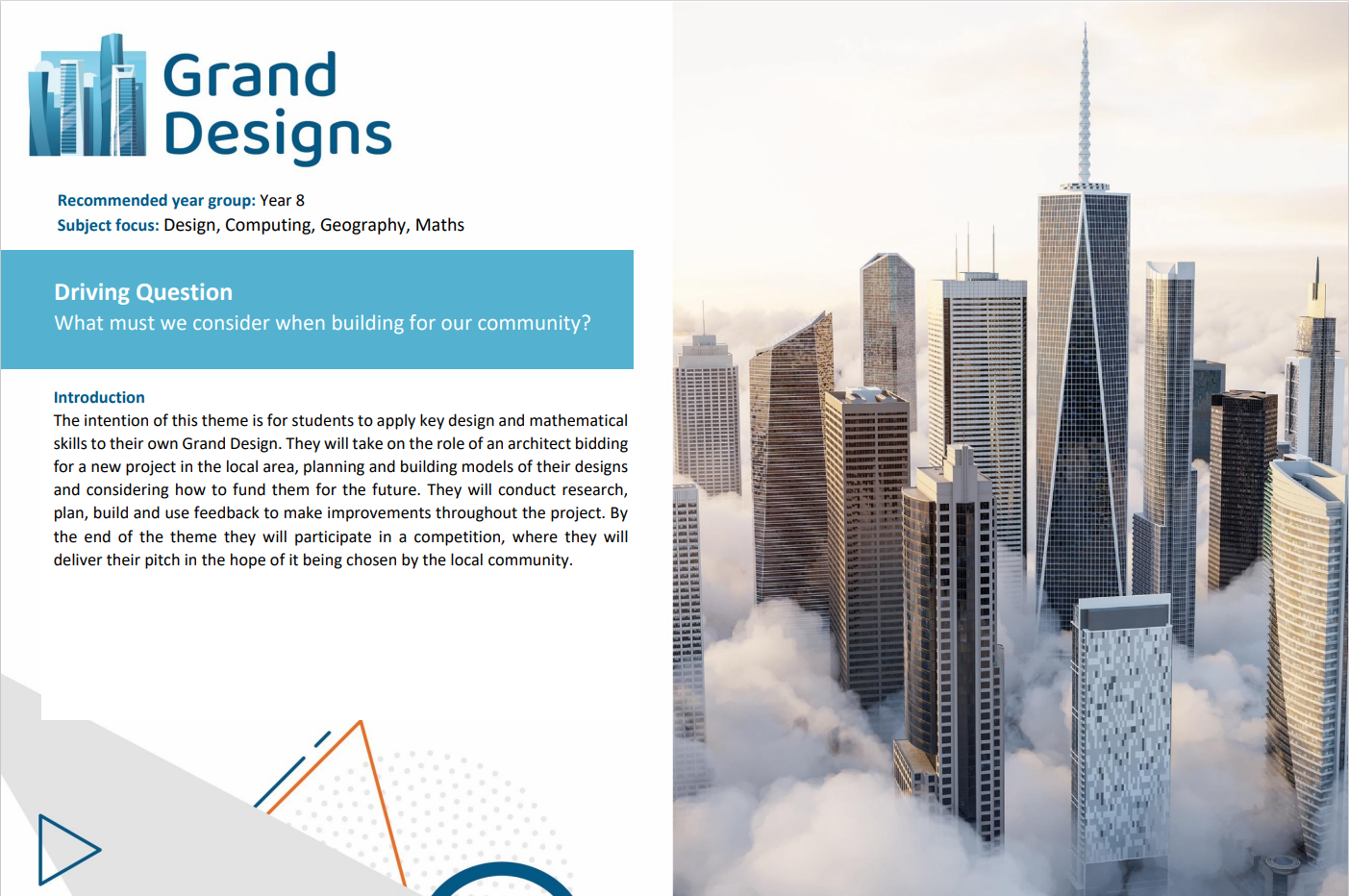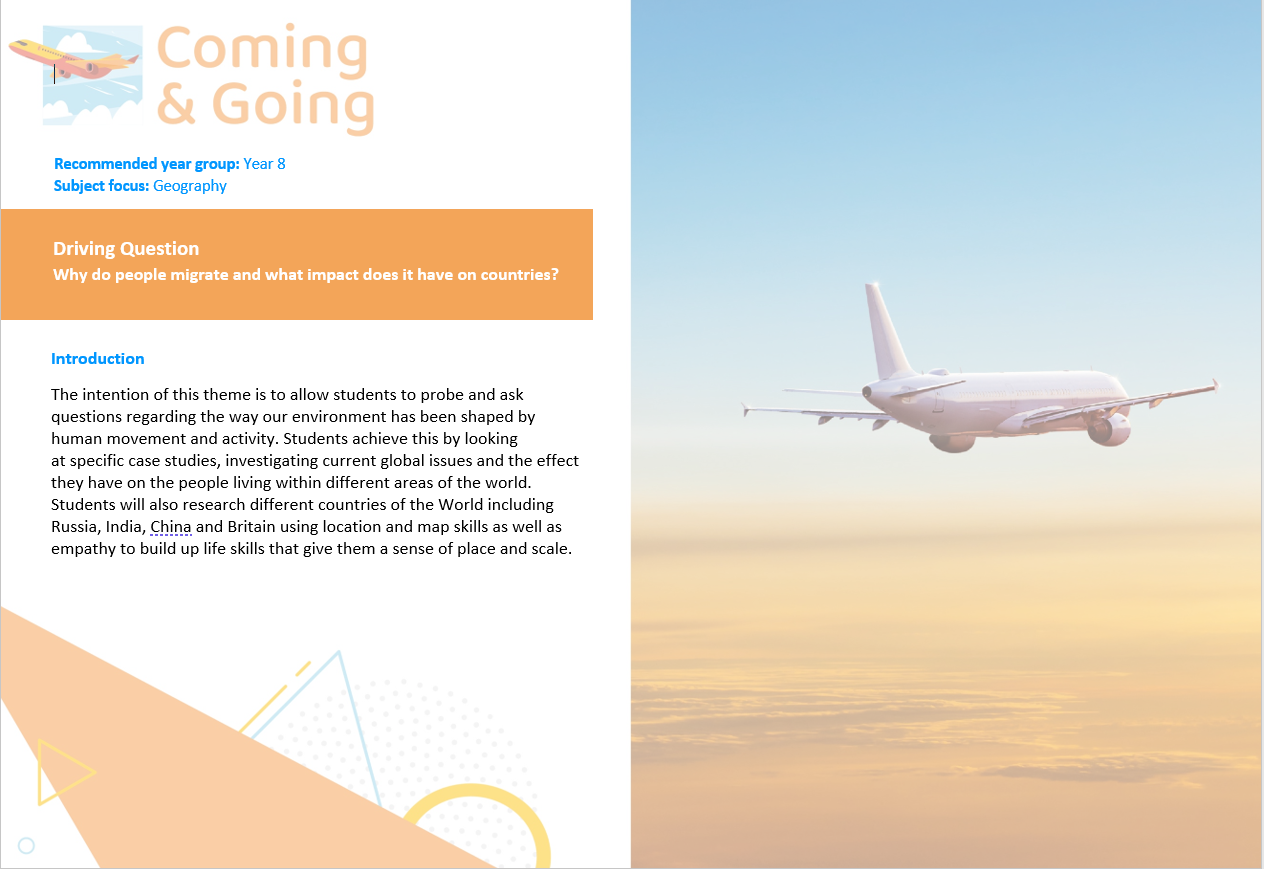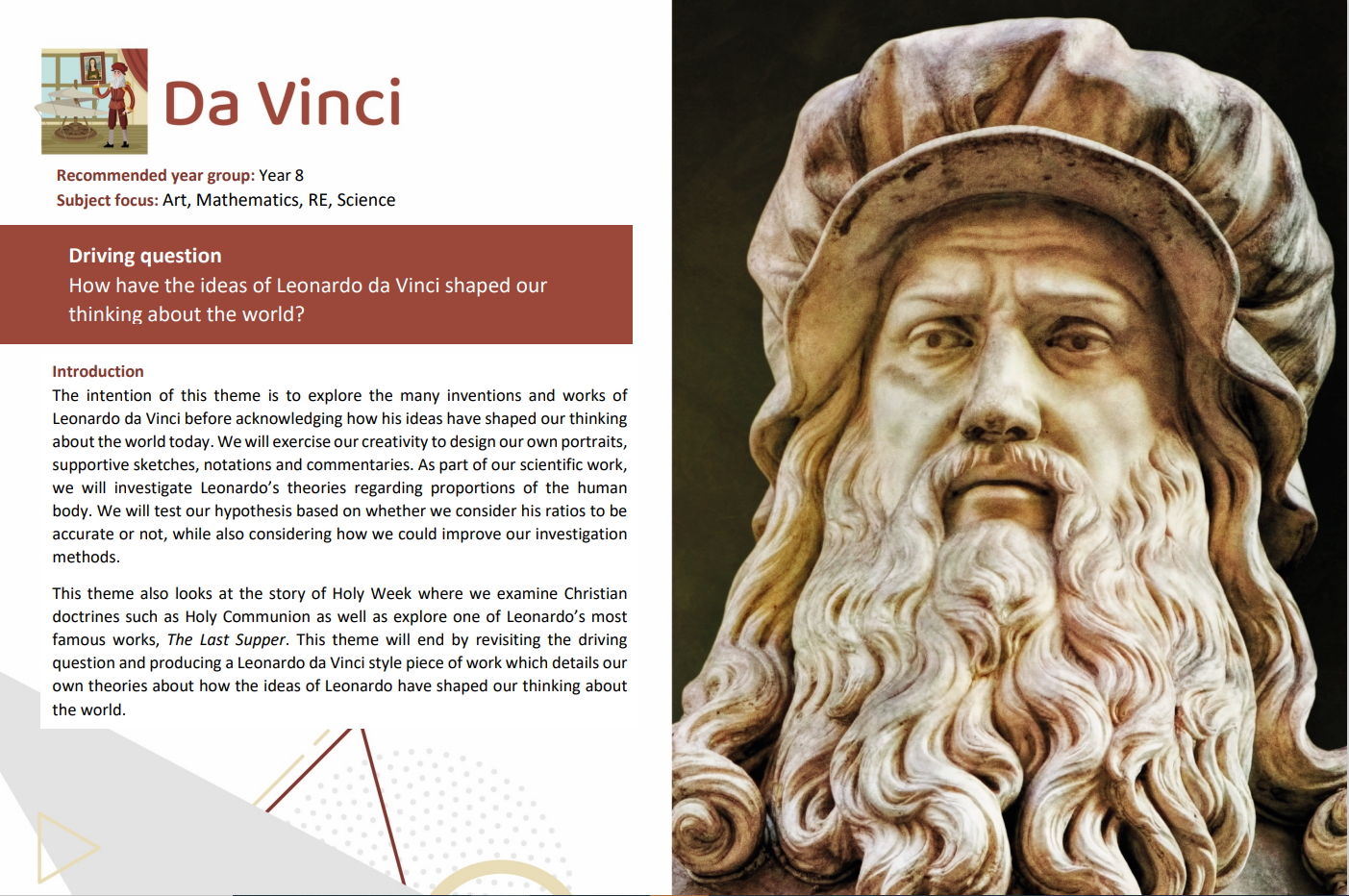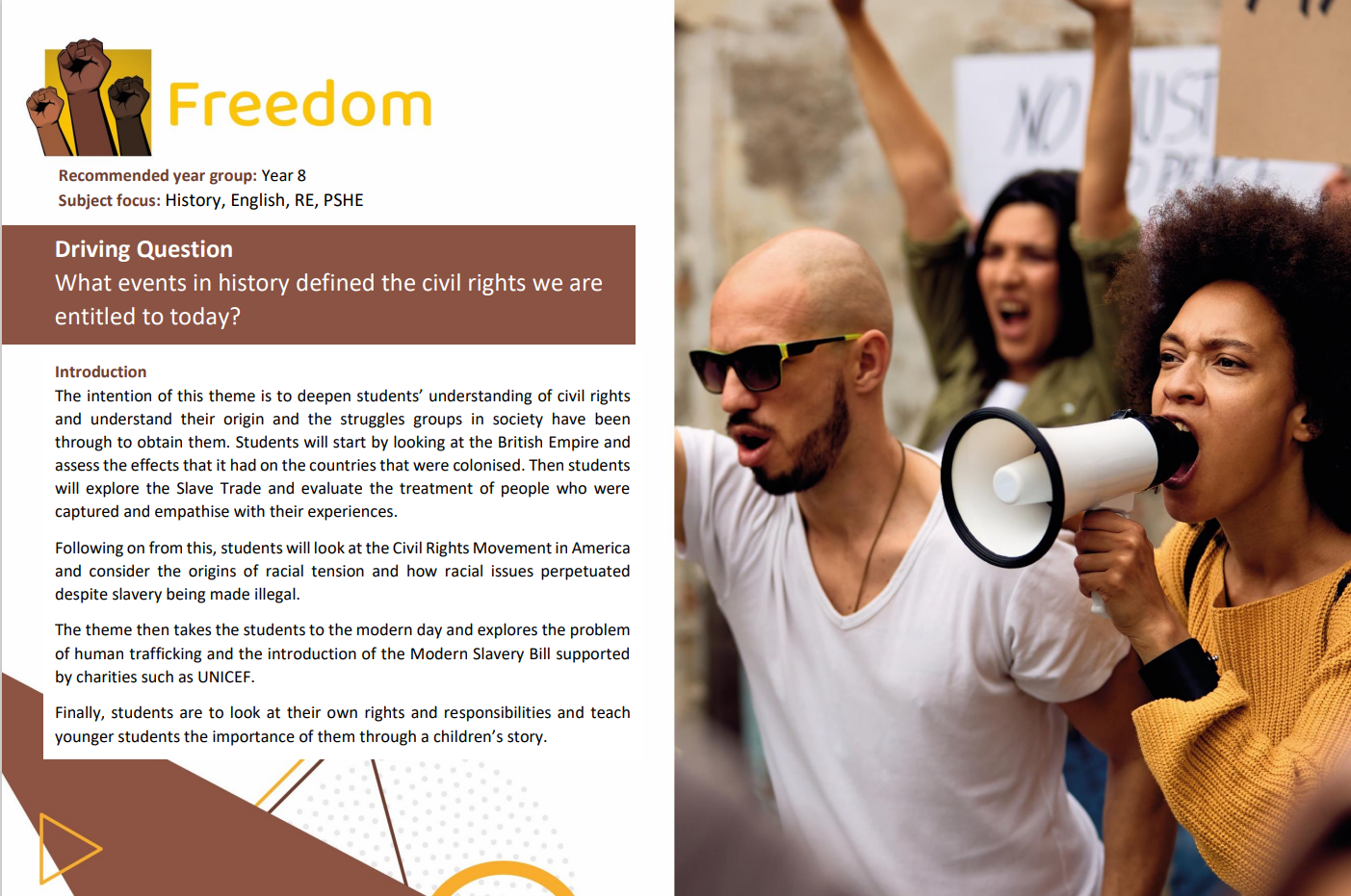Curriculum
Year 8 themes continue to build upon and develop the knowledge and skills of students. They may revisit some of the ideas that are covered in Year 7 but in greater depth.
Again, each theme lasts between three and four weeks and is centred around group work, research skills, audienced learning and technology. Below is a brief description of each theme.
Click on the icons for more subject information.
| Subject | |
| English |  |
| Science |  |
| Geography |  |
| History |  |
| RE |  |
| Technology |  |
| Computer Science |  |
Autumn Term
| Subject focus |    |
DRIVING QUESTION: How can positive changes come from negative events?
This unit covers many themes based around one main event in 1666.
The Fire of London is a major historical event, which signalled the end of the Great Plague of 1665 and the beginning of a new confidence in early modern Britain as well as physical changes to London
We look at these historical themes but we also address the issue of plague and fire, the science around them as well as the impact that they can have on society. Something that is important today more than ever.
| Subject focus |      |
DRIVING QUESTION: What must we consider when building for our community?
Students will take on the role of an Architect bidding for a new project in the local area; planning and building models of their designs and considering how to fund them for the future. They will conduct research, plan, build and use feedback to make improvements throughout the project.
The project will conclude with a competition, where students will deliver their pitch in the hope of it being chosen by the local community.
| Subject focus |    |
DRIVING QUESTION: Why do people migrate and what impact does it have on countries?
Britain has been shaped by the coming and going of people throughout the centuries. This theme allows students to explore how the migration of people has shaped the country, and the world, that we know today.
During this theme, students will be exploring how our environment has been shaped by human movement and activity. Students will be looking at specific case studies, investigating current global issues and the effect they have on the people living within specific areas of the world.
Students will also be looking at orientation and navigation, building up life skills that gives them a sense of place and scale.
| Subject focus |     |
DRIVING QUESTION: What made India the country it is today?
This unit is the study of a sub-continent from many different angles.
The subjects covered range from Geography to History and from RE through Art and Drama to English.
We discover the modern and old India and reflect why it is like it is.
This involves looking at India today and setting it in context from the influence of the Mughals to the British Raj as well as the influence of several different religions on the area.
Spring Term
| Subject focus |    |
DRIVING QUESTION: How have the ideas of Da Vinci shaped our thinking about the world?
During this Science, RE and Art-rich theme, students will have the opportunity to look at the many works of Leonardo Da Vinci beginning with some of his inventions such as the helicopter, parachute and cross-bow. Students will also exercise their creativity to design their own inventions with supportive sketches, notations and commentaries. They will also examine some of Da Vinci’s sketches and contents of coding such as mirror script notations.
During a lesson entitled Vitruvian Man, students will conduct an investigation based on Da Vinci’s theories regarding proportions of the human body. They will test their hypothesis based on whether they consider Da Vinci’s ratios to be accurate or not, whilst also considering how they could improve investigation methods within the classroom.
This theme also looks at the crucifixion of Jesus from a religious point of view where students examine doctrines such as Holy Communion and its origin. In the lesson entitled ‘Religious Paintings of Da Vinci’ students look at one of Leonardo’s most famous works- The Last Supper. During this lesson, Da Vinci’s inspirations are examined and students produce their own spiritual representations in the form of artwork and poetry.
Students will end the theme by revisiting the driving question and producing a documentary/media piece of work which details their own theories about Da Vinci being a man of religion or science including their supporting evidence.
| Subject focus |   |
DRIVING QUESTION: What events in history defined the civil rights we are entitled to today?
Students identify the different countries that made up the British Empire in 1780s – 1900s. What did Britain gain from each colony? What was given to the colonies in return? How important was trade in this exchange? What are the different interpretations surrounding the British Empire? Students then move onto looking at how the historical Slave Trade was established and how the slaves were captured, transported and auctioned.
Students then have the opportunity to explore the different reasons why Britain finally abolished slavery and the Slave Trade (political, economic, religious reasons, beliefs and ideals and the role of the media).
Students investigate how rights have been fought for in America; from Rosa Parks to Martin Luther King and Malcolm X. Students look at civil rights for black Americans today and the significance of key events today such as Black Lives Matter. They also focus on women’s rights and the most important factors that led to women gaining the right to vote in 1928. Finally the theme concludes at students exploring modern day right and responsibilities, the role of the UN to help protect human rights and whether modern day slavery still exist.
| Subject focus |   |
DRIVING QUESTION: How and why are the coastlines constantly changing?
This theme uses key geographical terminology to explain how the coastlines change over time. We study the inter-relationships of natural processes and human influences and how these two world work together or sometimes against each other to alter the coastline shape.
Students look at where we like to holiday and how this impacts the people, the geomorphic features and the economy of an area. Within this, they link to the morals of luxury resorts in poorer countries and how we can all become more sustainable too.
As the theme progresses, the focus will move towards a social and environmental context and students will be expected to plan an investigative trip. The aim is to take part in a fieldwork trip to a coastal region and write up fieldwork related to this trip.
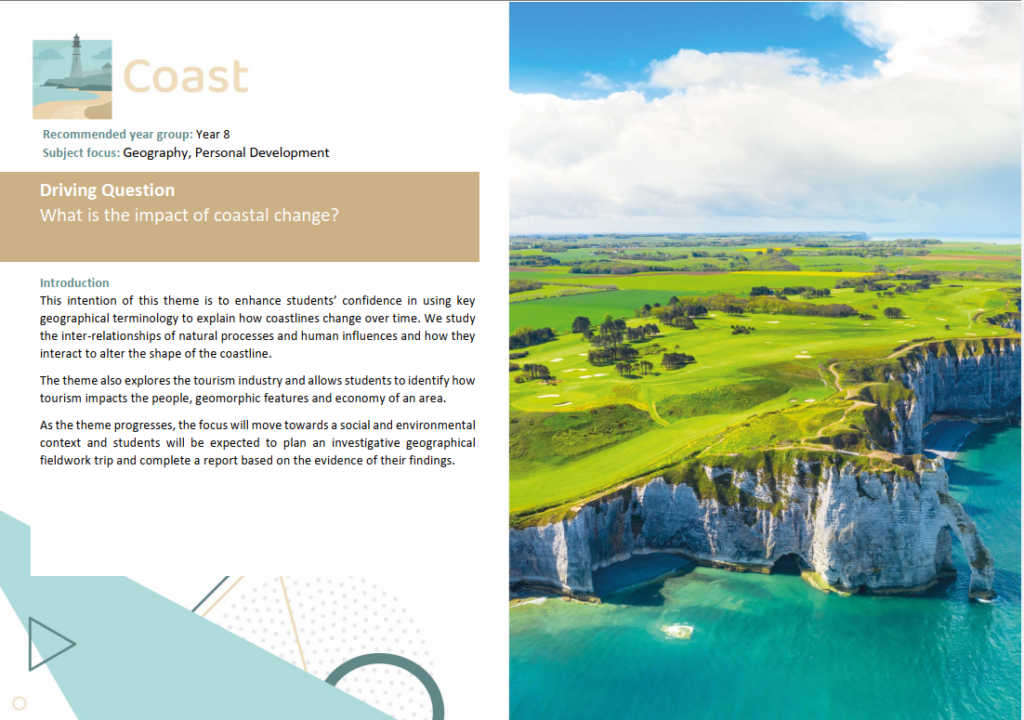
DRIVING QUESTION: What App can we design to improve people’s lives?
During this theme, students will:
- Work individually or as part of a team to complete a project
- Brainstorm a real-life problem that could be solved by an app
- Decide on an idea to take forward
- Identify the app features that would be most beneficial to potential users
- Design and prototype an app
- Promote their app idea to potential investors
Summer Term
| Subject focus |     |
DRIVING QUESTION: What impact has the Industrial Revolution had on living conditions today?
Please Sir explores the Industrial Revolution in Britain, with its main focus around education and industry. Students investigate the differences between the conditions of this time and the modern world. They will explore and research some of the fundamental differences within the world of work, schools and inventions before discovering the difficult circumstances of children through William Blake’s poetry and eyewitness accounts. Students will also use Dickens’ Oliver Twist to create pieces of script that reflect the themes and plot of the original text, helping them prepare for an extended piece of writing discussing the potential return of corporal punishment. Students also experience a typical school day similar to Victorian times to compare the differences in teaching and learning styles, subjects and activities.
As part of their study students are encouraged to consider the Industrial Revolution and what a challenging time it was for some. They will also learn that there were crucial advances in technology that directly influenced Britain today, including transport, machinery and domestic items that we still see in the UK. Students will also research some of the key figures of a time that was pivotal in shaping their local area and in turn, the Industrial Revolution as a whole.
The theme concludes with students participating in typical Victorian entertainment by exploring melodrama and presenting a piece of practical work in this style. By the end of the theme, students should be able to see a variety of differences from 19th century Britain and today, but also able to articulate how the Industrial Revolution shaped the world around them.
Find out more about Please Sir

| Subject focus |    |
DRIVING QUESTION: Was World War One a ‘Great War?’
The Over the Top theme focuses on the First World War (1914-1918), incorporating religion, ethics, war poetry and literature, human and physical geography, as well as history. Students will become familiar with the place of sources and interpretations in historical study, learning how to analyse and evaluate their usefulness and reliability, deepening their critical skills. Students develop a chronological understanding of the key events of the First World War and assess their impact on both those fighting on the Western front but also those men, women, and children on the Home Front. Key religious and ethical issues are explored through studying the impact of war on women, religious and ethnic minorities, conscientious objectors, and animals as well as assessing responses to the conflict.
Find out more about Over The Top
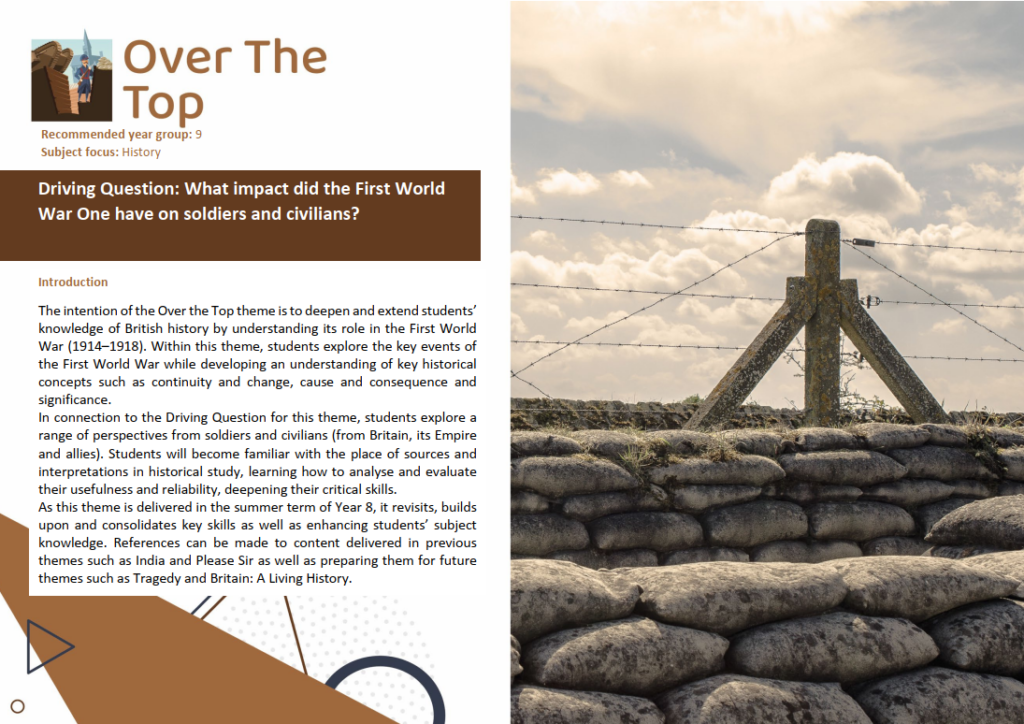
Review and Exam Weeks will be held twice during the year, at the end of the Autumn term and in the Summer term.
There will also be a series of Focus Days embedded within themes where students can explore an idea in greater depth. Focus Days can include off-site visits, guest speakers and workshops.


